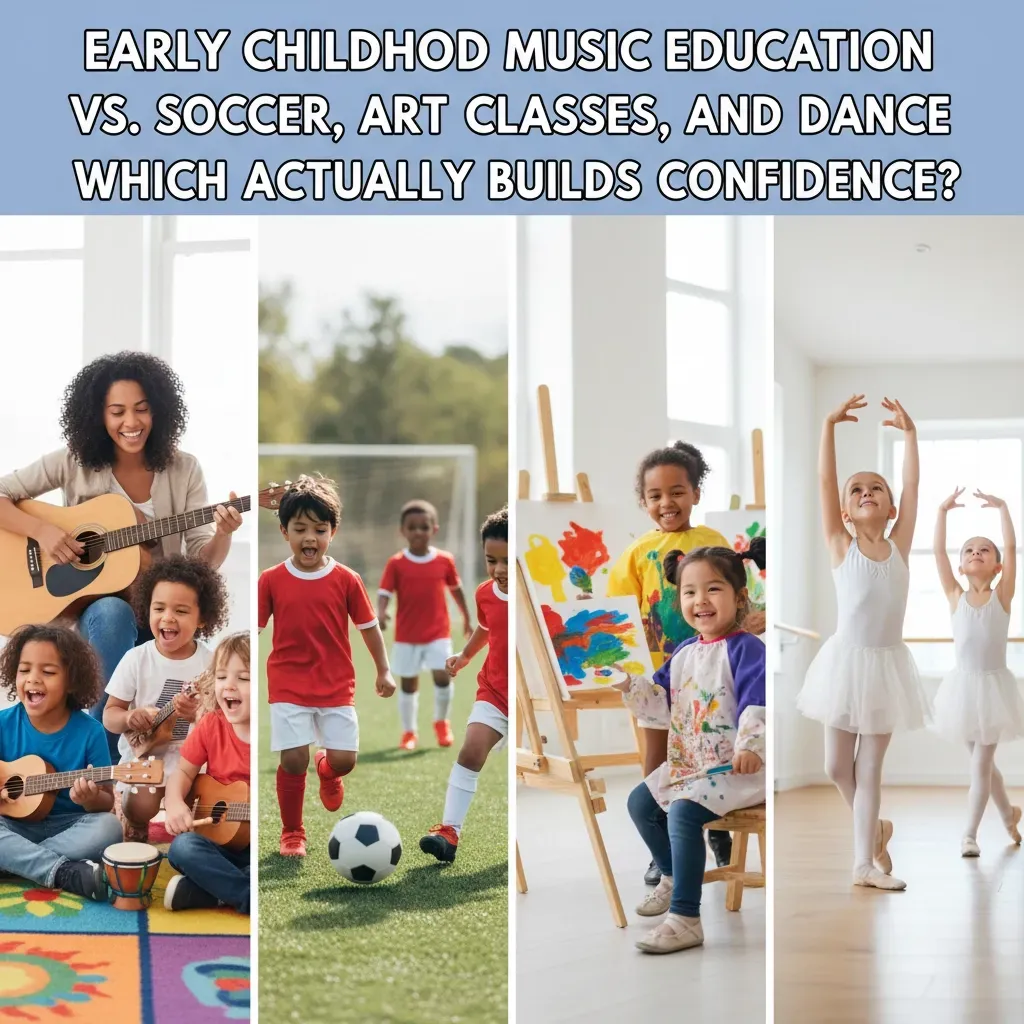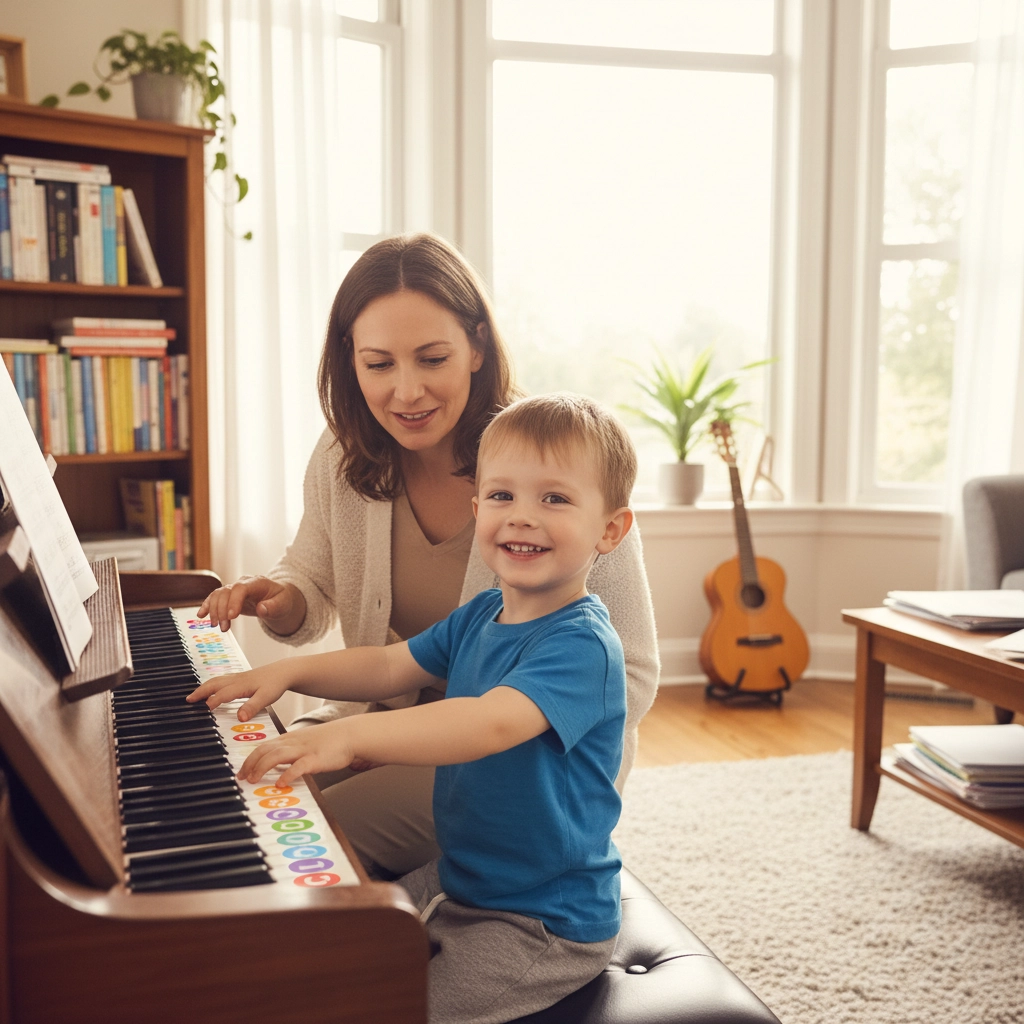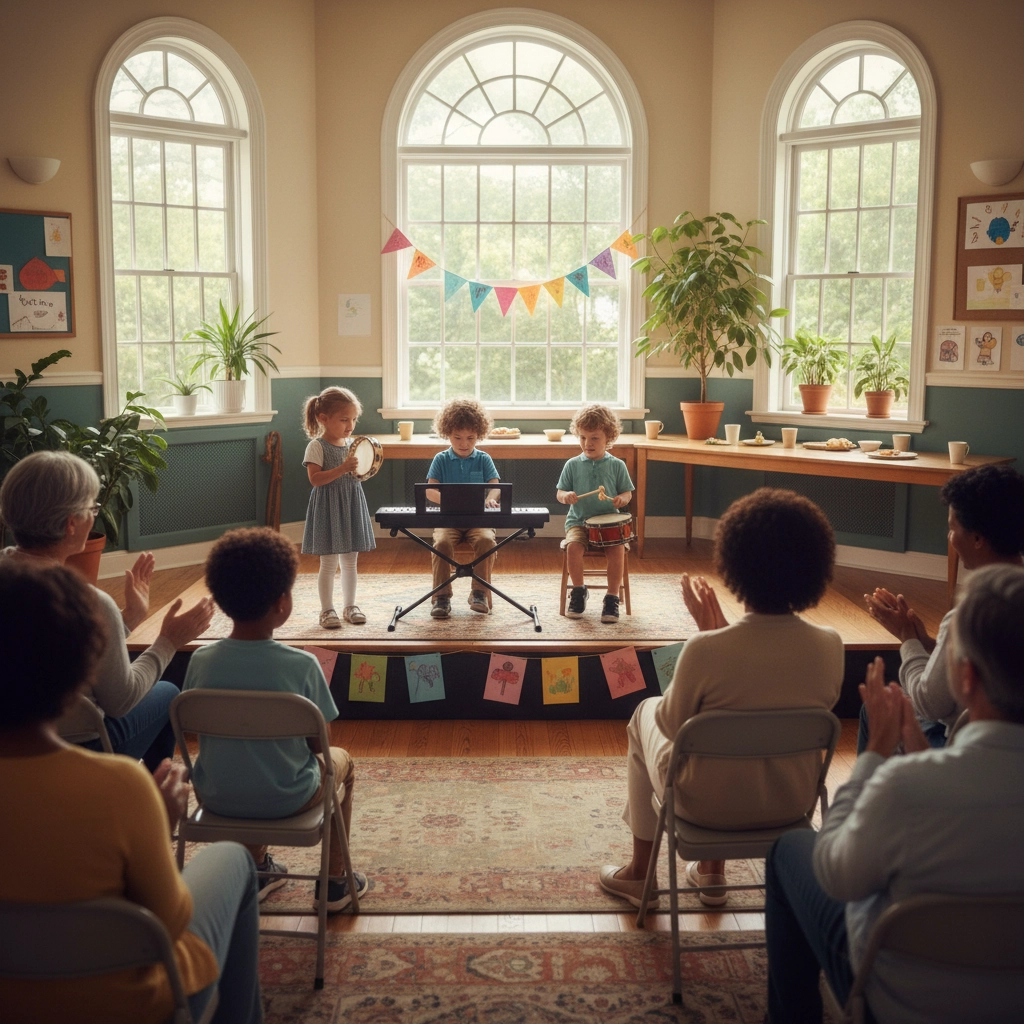
Early Childhood Music Education Vs. Soccer, Art Classes, and Dance: Which Actually Builds Confidence?
Picture this: You're walking down Court Street in Carroll Gardens, passing the soccer fields at Carroll Park, when you overhear another mom talking about her 4-year-old's packed schedule. "Emma has dance on Mondays, art class on Wednesdays, and soccer on Saturdays," she says proudly.
Your heart sinks a little. Is your child falling behind? Are you missing the window for building their confidence? With so many activity options in our neighborhood: from the Little Dancers Studio to Brooklyn Art classes to youth soccer leagues: how do you know which one will actually give your child the confidence boost they need?
Here's the truth that might surprise you: while soccer, art classes, and dance all have their merits,early childhood music education stands out as the most powerful confidence-builder for young children. And the science backs this up in ways that will make you rethink everything you thought you knew about childhood activities.
Why Confidence Matters More Than You Think
Before we dive into the comparison, let's talk about why this matters. Confidence isn't just about feeling good: it's the foundation for everything your child will do in life. A confident child speaks up in class, tries new things, bounces back from setbacks, and develops the resilience they'll need as they grow.
But here's what many Carroll Gardens parents don't realize:not all confidence is created equalSome activities build surface-level confidence that fades when the activity ends, while others create deep, lasting self-assurance that carries into every area of life.

The Soccer Approach: Physical Confidence
Let's start with soccer: probably the most popular choice among Carroll Gardens families. The youth leagues at Carroll Park are always bustling, and there's something undeniably appealing about watching your little one kick a ball around with friends.
Soccer builds confidence through physical mastery and team achievement. When your child scores their first goal or makes a great pass, they get an instant confidence boost. The competitive nature teaches resilience, and the team environment builds social skills.
But here's the catch: soccer confidence is often tied to external validation and comparison with others. Your child feels great when they win, but what happens when they lose? What about the naturally less athletic kids who spend most games on the sidelines?
The Art Class Route: Creative Confidence
Art classes offer a completely different approach. At places like the Brooklyn Art Library or local studios, children build confidence through self-expression and personal creativity. There's no "right" way to make art, which can be incredibly freeing for anxious children.
Art builds confidence by giving kids a safe space to express emotions and ideas they might not have words for yet. It develops fine motor skills and cognitive abilities while allowing for individual pace and style.
The downside? Art confidence tends to be more internal and may not translate as directly to other areas like academic performance or social situations. While valuable, it's often more limited in scope than parents hope.
The Dance Option: Expressive Confidence
Dance combines physical movement with creative expression, making it appealing to many families. The dance studios along Smith Street offer everything from ballet to hip-hop for toddlers and preschoolers.
Dance builds confidence through performance opportunities and body awareness. Children learn to express themselves through movement while developing coordination and rhythm. The group aspect teaches cooperation and timing.
However, dance confidence is often performance-based and can create anxiety around "looking right" or keeping up with others. For naturally shy children, the performance aspect might feel more intimidating than confidence-building.

The Music Education Advantage: Multi-Layered Confidence
Now, here's where music education shines: and why neuroscientists are calling it the "ultimate brain workout" for young children.
Unlike other activities that build confidence in one primary area,music education creates confidence on multiple levels simultaneously:
Cognitive Confidence: Learning music literally rewires the brain. Studies show that children who start music lessons early develop stronger connections between brain hemispheres, leading to improved problem-solving skills, better memory, and enhanced language development. This translates to confidence in academic settings that lasts a lifetime.
Emotional Confidence: Music is a direct pathway to emotional processing and regulation. When your 3-year-old learns to play a simple melody, they're also learning to manage their emotions, focus their attention, and express feelings in a healthy way. This emotional intelligence becomes the foundation for social confidence.
Performance Confidence: Unlike sports where only some children get to shine, every child can have a moment in music. Whether it's playing "Twinkle Twinkle Little Star" for grandma or participating in a recital, music offers regular opportunities for achievement and recognition.
Social Confidence: Music teaches children to listen, respond, and collaborate in unique ways. They learn to take turns, follow a conductor, and blend their voice with others: skills that translate directly to classroom and social settings.

The Carroll Gardens Reality Check
Let's be honest about life in Carroll Gardens. We're a neighborhood of high-achieving families who want the best for our children. The pressure is real, and the competition starts early.
But here's what many parents miss: starting music education at age 3 or 4 gives your child advantages that compound over time. While other kids are learning to kick a ball or hold a paintbrush, your child is developing neural pathways that will help them excel in math, reading, languages, and social situations.
Think about it this way: the child who starts piano at 3 isn't just learning piano. They're developing:
Mathematical thinking through rhythm and counting
Reading skills through note recognition
Memory and attention through practice
Confidence through regular small victories
Emotional regulation through musical expression
By kindergarten, these children often outperform their peers not just in music, but across the board.
The Science That Should Convince You
Here's the research that made me a believer: children who receive music education before age 5 show measurably different brain development than those who don't. Their brains develop more connections, stronger memory centers, and better integration between logical and creative thinking.
A landmark study followed children for 10 years and found that those who started music lessons early had higher IQs, better social skills, and greater academic achievement throughout elementary school: even after controlling for family income and parents' education levels.
Most importantly for anxious parents: these children showed significantly lower levels of anxiety and higher self-esteem compared to children in other activities.

Why Waiting Is the Biggest Mistake
Here's the urgency every Carroll Gardens parent needs to understand: the window for maximum benefit is narrowing every day. The brain's plasticity: its ability to form new connections: is at its peak between ages 3 and 6.
Starting soccer at 6 instead of 4? No big deal. Starting art classes at 7 instead of 5? Still beneficial. But starting music education at 7 instead of 3? You've missed the window for the most profound neurological benefits.
This doesn't mean older children can't benefit from music: they absolutely can. But the children who start earliest get advantages that last a lifetime.
The Musicolor Method NYC Difference
At Musicolor NYC, we've developed something special for Carroll Gardens families who understand that early childhood music education isn't just about learning songs: it's about building the foundation for lifelong confidence and success.
Our color-based method makes music accessible and engaging for children as young as 3, turning abstract musical concepts into concrete, visual learning experiences. We come to your home, work with your child's schedule, and focus on building confidence from the very first lesson.

Making the Right Choice for Your Child
So what's the verdict? While soccer, art, and dance all have their place, music education offers the most comprehensive confidence-building experience for young children. It's the only activity that simultaneously develops cognitive, emotional, social, and performance confidence while creating lasting neurological advantages.
The choice isn't really between activities: it's between giving your child every possible advantage or wondering "what if?" years from now.
Your Carroll Gardens neighbors are already discovering this secret. The question is: will you join them, or will you let another week pass while your child's optimal learning window gets smaller?
Ready to give your child the confidence advantage that lasts a lifetime? With Musicolor Method NYC, the sooner they start, the bigger the benefit. And in a neighborhood like ours, can you really afford to wait?
Ready to give your child the confidence boost they deserve? Book a free consultation today and discover how easy and fun music lessons can be—right from your home!
